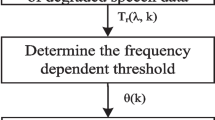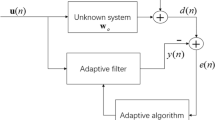Abstract
Channel estimation (CE) is one of the crucial and fundamental elements of signal processing, especially considering the requirement of high accuracy in future wireless communication systems. Most traditional CE algorithms are explored under the assumption of Gaussian white noise, which limits the algorithms performance in real wireless communication situations. In this work, a novel self-adaptive CE algorithm based on the maximum entropy principle (MEP) was studied, which analyzes the statistical components of an arbitrary noise environment. In addition, an MEP channel-based signal estimation algorithm was studied. Furthermore, the statistical characteristics of channels were considered the regularization terms in the objective function for providing prior information and further increasing the accuracy. It was found that the proposed algorithm not only provides accurate CE but also reduces pilot consumption by using estimated signal data as pseudo pilots. The superior features of the proposed method concerning CE accuracy, pilot consumption, and robustness were confirmed through Monte Carlo simulations.
Similar content being viewed by others
References
Yuan H, Kam P Y. Soft-decision-aided, smoothness-constrained channel estimation over time-varying fading channels with no channel model information. IEEE Trans Wireless Commun, 2017, 16: 73–86
Shafi M, Molisch A F, Smith P J, et al. 5G: a tutorial overview of standards, trials, challenges, deployment, and practice. IEEE J Sel Areas Commun, 2017, 35: 1201–1221
Larsson E G, Edfors O, Tufvesson F, et al. Massive MIMO for next generation wireless systems. IEEE Commun Mag, 2014, 52: 186–195
Sohrabi F, Liu Y F, Yu W. One-bit precoding and constellation range design for massive MIMO with QAM signaling. IEEE J Sel Top Signal Process, 2018, 12: 557–570
Zhang F, Sun S, Gao Q, et al. Enhanced CSI acquisition for FDD multi-user massive MIMO systems. IEEE Access, 2018, 6: 23034–23042
Takano Y, Juntti M, Matsumoto T. l1 LS and l2 MMSE-based hybrid channel estimation for intermittent wireless connections. IEEE Trans Wireless Commun, 2016, 15: 314–328
Xie H X, Gao F F, Jin S. An overview of low-rank channel estimation for massive MIMO systems. IEEE Access, 2016, 4: 7313–7321
Fang J, Li X, Li H, et al. Low-rank covariance-assisted downlink training and channel estimation for FDD massive MIMO systems. IEEE Trans Wireless Commun, 2017, 16: 1935–1947
Qi C H, Dong P H, Ma W Y, et al. Acquisition of channel state information for mmWave massive MIMO: traditional and machine learning-based approaches. Sci China Inf Sci, 2021, 64: 181301
He H T, Wen C K, Jin S, et al. Deep learning-based channel estimation for beamspace mmWave massive MIMO systems. IEEE Wireless Commun Lett, 2018, 7: 852–855
Huang H, Yang J, Huang H, et al. Deep learning for super-resolution channel estimation and DOA estimation based massive MIMO system. IEEE Trans Veh Technol, 2018, 67: 8549–8560
Ma X, Gao Z, Gao F F, et al. Model-driven deep learning based channel estimation and feedback for millimeter-wave massive hybrid MIMO systems. IEEE J Sel Areas Commun, 2021, 39: 2388–2406
Xu W, Gao F F, Zhang J, et al. Deep learning based channel covariance matrix estimation with user location and scene images. IEEE Trans Commun, 2021, 69: 8145–8158
Zhang H P, Xue J, Meng D Y, et al. Robust CSI estimation under complex communication environment. In: Proceedings of IEEE International Conference on Communications, Shanghai, 2019. 1–6
Kozick R J, Blum R S, Sadler B M. Signal processing in non-Gaussian noise using mixture distributions and the EM algorithm. In: Proceedings of Asilomar Conference on Signals, Systems and Computers, Pacific Grove, 1997. 438–442
Bhatia V, Mulgrew B. Non-parametric likelihood based channel estimator for Gaussian mixture noise. Signal Processing, 2007, 87: 2569–2586
Sadler B M, Kozick R J. Maximum-likelihood array processing in non-Gaussian noise with Gaussian mixtures. IEEE Trans Signal Process, 2000, 48: 3520–3535
Jaynes E T. Information theory and statistical mechanics. Phys Rev, 1957, 108: 171–190
Saberali S M, Amindavar H. Nonlinear detector design for CDMA signals in the presence of unknown interferers using maximum entropy method and comparison with SIC. IEEE Commun Lett, 2014, 18: 737–740
Li H, Li X L, Anderson M, et al. A class of adaptive algorithms based on entropy estimation achieving CRLB for linear non-Gaussian filtering. IEEE Trans Signal Process, 2012, 60: 2049–2055
Wee J, Jeon W, Lee Y, et al. Pilot and data aided channel estimation for OFDM systems in rapidly time-varying channels. In: Proceedings of IEEE 69th Vehicular Technology Conference, Barcelona, 2009. 1–5
Ma J J, Ping L. Data-aided channel estimation in large antenna systems. IEEE Trans Signal Process, 2014, 62: 3111–3124
Ju M Y, Xu L, Jin L, et al. Data aided channel estimation for massive MIMO with pilot contamination. In: Proceedings of IEEE International Conference on Communications, Paris, 2017. 1–6
Yin H F, Gesbert D, Filippou M, et al. A coordinated approach to channel estimation in large-scale multiple-antenna systems. IEEE J Sel Areas Commun, 2013, 31: 264–273
Xie H, Gao F F, Zhang S, et al. A unified transmission strategy for TDD/FDD massive MIMO systems with spatial basis expansion model. IEEE Trans Veh Technol, 2017, 66: 3170–3184
Tibshirani R. Regression shrinkage and selection via the Lasso. J R Statistical Soc Ser B-Stat Methodol, 1996, 58: 267–288
Guiasu S, Shenitzer A. The principle of maximum entropy. Math Intell, 1985, 7: 42–48
Cover T M, Thomas J A. Elements of Information Theory. Hoboken: John Wiley & Sons, 1999
Myung I J, Pitt M A. Applying Occam’s razor in modeling cognition: a Bayesian approach. Psychonomic Bull Rev, 1997, 4: 79–95
Du H, Deng Y, Xue J, et al. Robust online CSI estimation in a complex environment. IEEE Trans Wireless Commun, 2022, 21: 8322–8336
Bishop C M, Nasrabadi N M. Pattern Recognition and Machine Learning. Berlin: Springer, 2006
Hu Z Y, Xue J, Meng D Y, et al. MEP-based channel estimation under complex communication environment. In: Proceedings of IEEE International Conference on Communications, Dublin, 2020. 1–5
Boyd S, Parikh N, Chu E, et al. Distributed optimization and statistical learning via the alternating direction method of multipliers. FNT Machine Learn, 2010, 3: 1–122
Xu Y C, Liu X D, Shen Y L, et al. Multi-task learning with sample re-weighting for machine reading comprehension. 2018. ArXiv:1809.06963
Dang X, Huang Z, Zhu L, et al. Block Turbo code in white Laplacian noise. Acta Aeronaut Astronaut Sin, 2016, 37: 3494–3501
Acknowledgements
This work was supported by National Key R&D Program of China (Grant No. 2020YFA0713900), Macao Science and Technology Development Fund (Grant No. 061/2020/A2), National Natural Science Foundation of China (Grant Nos. 61721002, 12226004, 62076196), and in part by Major Key Project of Peng Cheng Laboratory (Grant No. PCL2023AS1-2).
Author information
Authors and Affiliations
Corresponding author
Rights and permissions
About this article
Cite this article
Hu, Z., Xue, J., Li, F. et al. Robust channel estimation based on the maximum entropy principle. Sci. China Inf. Sci. 66, 222304 (2023). https://doi.org/10.1007/s11432-023-3822-9
Received:
Revised:
Accepted:
Published:
DOI: https://doi.org/10.1007/s11432-023-3822-9




